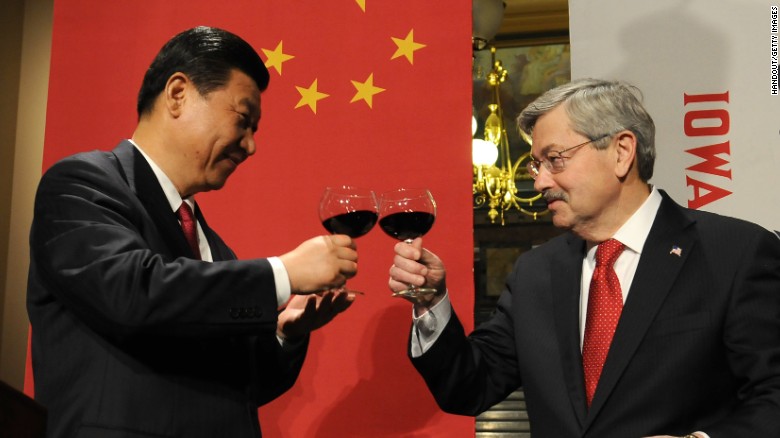
Iowa Gov. Terry Branstad has been picked for the post of US ambassador to China by President-elected Donald Trump.
Trump spokesperson Jason Miller confirmed that Branstad had accepted the offer on the transition’s daily call with reporters. Miller also said that Branstad will join Trump at his Des Moines rally Thursday, one of the stops on Trump’s “thank you” tour of rallies in swing states.
Miller cited Branstad’s experience in public policy, trade, and agriculture as attributes that led to his selection as Trump’s envoy in Beijing. Branstad, Miller said, “has a tremendous understanding of China and the Chinese people, and is someone who very much impressed the President-elect, not just during their meetings on the campaign trail but also in their meetings after the election.”
“It’s very clear that Gov. Branstad is someone who will represent our country well on the world stage, and we couldn’t be prouder of this selection,” Miller said.
‘Long-time relationship’
The Trump campaign formally announced the decision in a statement Wednesday afternoon.
“Governor Branstad’s decades of experience in public service and long-time relationship with President Xi Jinping and other Chinese leaders make him the ideal choice to serve as America’s Ambassador to China,” Trump said in a statement.
Branstad is uniquely well-suited to the job, having a close, decades-long relationship with Xi. The two have known each other since 1985, when Xi visited Iowa as a provincial official on a state exchange program during Branstad’s first term as governor, and have maintained a friendship of sorts — Xi met with Branstad during a visit to the US in 2012 as a vice-president on the verge of taking power in China.
At a press conference Wednesday, Chinese Foreign Ministry spokesman Lu Kang said Branstad “is an old friend of the Chinese people, and we welcome his greater contribution to the development of China-US relations.”
Diplomacy
But their warm personal relationship may be soon put to the test.
The next ambassador to China will confront a number of high-stakes diplomatic challenges in the U.S.-China relationship, including growing tensions over the disputed South China Sea, the implementation of the Paris climate change agreement, and the two countries’ economic and trade relationship.
Trump has already signaled an aggressive posture toward China, bucking decades of US foreign policy by taking a congratulatory call from the president of Taiwan, and sending a series of bellicose tweets about currency devaluation and tariffs.
“Did China ask us if it was OK to devalue their currency (making it hard for our companies to compete), heavily tax our products going into their country (the U.S. doesn’t tax them) or to build a massive military complex in the middle of the South China Sea? I don’t think so!” Trump wrote in a series of tweets on Sunday after China expressed umbrage at his call with the president of Taiwan.
And Branstad has differences of his own with Trump. He was a supporter of the Trans-Pacific Partnership trade deal — a major factor in U.S. foreign policy in Asia, and a deal that Trump stridently opposed during his campaign. Branstad has argued that the deal would help workers and farmers in Iowa.
The Iowa governor is also a GOP kingmaker as the highest-elected Republican in the crucial first primary state, but he didn’t endorse Trump until May, after the GOP field had cleared. And though he never rescinded his endorsement, Branstad freely criticized Trump during some of his most controversial episodes, such as when he mocked Sen. John McCain for being a prisoner of war, and when the “Access Hollywood” leaked.
As reported by CNN
